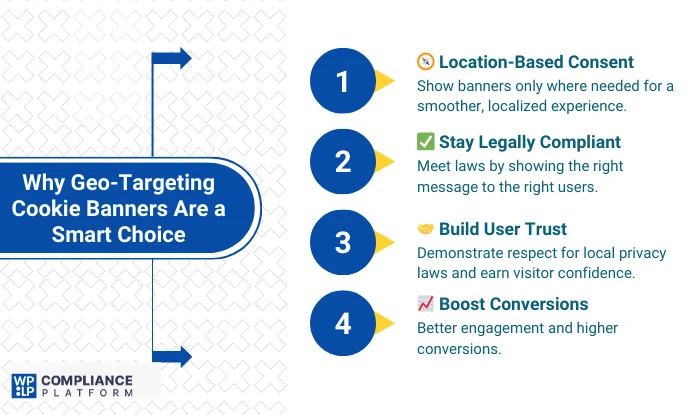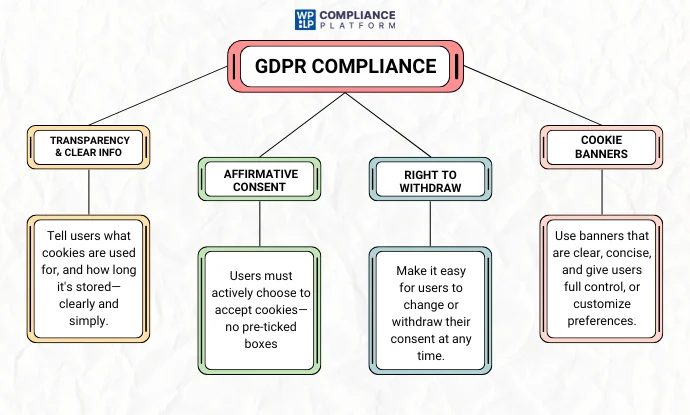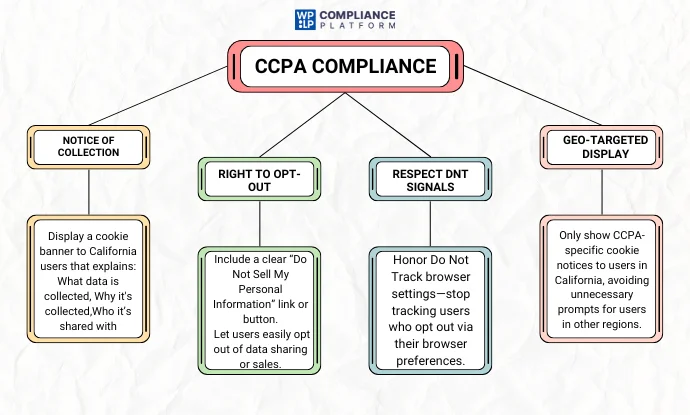How to Add Geo-Targeted Cookie Banners in WordPress

Are you aware that you can use geo-targeting cookie banners to streamline your cookie consent process?
As online privacy is becoming an increasingly top-of-mind issue for users and regulators, never has there been a greater need for an effective and transparent cookie consent approach.
Geo-targeting cookie banners present a more modern solution to meeting privacy regulations while creating a more pleasant user experience.
This article will find out how a geo-targeting cookie banner can simplify the process, guarantee legal compliance, and engender trust with your audience.
What is Cookie Banner Geo-Targeting
Cookie banner geo-targeting is a smart feature that enables websites to show cookie banners to people located in specific regions. A cookie banner is a small notification that you see when you visit a page.
It informs you that the site is employing cookies, small files on your computer to store things like your login details, your items in shopping cart, or what pages you’ve seen. Some countries, like those in the European Union, have quite stringent privacy laws (like the GDPR) that compel websites to get permission first before they can employ the use of cookies.
This is where Geo-targeting comes in. “Geo” is short for location, and “targeting” is for choosing who sees something.
So, cookie banner geo-targeting refers to showing the cookie banner just to individuals within countries or geographical regions where it’s mandatory by law.
For example, a site might show the banner to someone in Europe but not to someone in India or the US, where the same regulation may not apply. This allows website owners to be within the law without annoying people who don’t have to see the banner.
It also allows for a smoother, more relevant user experience for overseas visitors. Cookie banner geo-targeting allows websites to show the right messages to the right people, based on where they are, in a less complicated manner, in order to be legally compliant and user-friendly as well.
Why Geo-Targeting Cookie Banner is a Smart Choice
By using geo-targeting cookie banners, you are able to ensure that you’re abiding by data privacy regulations and offering users a more relevant and personalized experience.

- Improved User Experience: By showing cookie consent messages that are customized to your user’s area, geo-targeting eliminates confusion and makes the experience more intuitive.
- Legal Compliance: Geo-targeting assists companies in adhering to multiple data privacy regulations like the General Data Protection Regulation (GDPR) in Europe and the California Consumer Privacy Act (CCPA) in the US. These regulations typically mandate particular methods for collecting cookie consent, and geo-targeting guarantees that the proper messages are shown.
- More Trust: If your website shows you are making efforts to adhere to local laws, it is possible to gain the trust of users.
- Enhanced Conversion Rates: Geo-targeting has the potential to deliver increased conversion rates and improved user engagement by giving a more relevant and user-friendly cookie consent experience.
Geotargeting Cookie Banner Examples
Geotargeting is most commonly employed in advertising to provide location-specific content to users. Some real-world examples follow:
- Retail Stores: An online apparel retailer markets winter coats to users in cold areas while marketing swimwear to users in hot areas.
- Restaurants: A fast-food outlet provides geo-targeting adverts, like a “$5 Meal Deal”, specific to customers in city centers.
- Travel Agencies: Exhibiting promotional travel packages to users planning flights from particular cities or states.
- Local Events: Advertising an upcoming concert to users within 50 miles of the event location.
- E-commerce: Exhibiting free shipping promotions to users in particular states in order to invite more spending.
How Does Geotargeting for Cookie Banner Work?
Geo-targeting for cookie notices operates by identifying the location of a user and displaying (or not displaying) the notice according to regional data protection laws. Here is how it takes place:
1. Location Detection
When a user enters a website, their location is detected by a number of technologies:
- IP Address: The most popular method. It approximates the country or region of the user by associating their IP with a geographic location.
- Wi-Fi and GPS (for mobile users): These might also give more precise location information, particularly in mobile applications or advanced setups.
2. Legal Mapping
The plugin or website maps the location discovered against a list of jurisdictions that have cookie consent laws, like the European Union (GDPR), California (CCPA/CPRA), Canada (PIPEDA), and Brazil (LGPD)
3. Conditional Display
The banner will automatically appear if the visitor is from a cookie consent jurisdiction. Otherwise, the banner will be hidden so users are not needlessly interrupted.
4. Compliance Configuration
Many website owners or plugin configurations enable manual or automated rules to dictate what banner version displays in which country in order to display the appropriate legal text and options based on geographical location.
By leveraging geotargeting, businesses can ensure their ads reach the right audience at the right place and time, maximizing relevance and impact.
Legal Requirements for Cookie Consent
Some of the most important global regulations that define cookie consent are:
1. General Data Protection Regulation (GDPR): This European Union law is applicable to any organization that processes the personal data of EU citizens, even if the organization itself is not based in the EU.
The GDPR mandates that websites offer adequate information regarding the types and purposes of cookies that will be used and secure explicit and affirmative consent before placing non-essential cookies.
2. California Consumer Privacy Act (CCPA): This California statute covers enterprises that qualify on certain levels of revenue, volume of data, or other factors. The CCPA entitles consumers to learn about what personal data is gathered, ask for deletion, and opt out of its sale.
While it does not impose prior permission for cookies like the GDPR, companies do have to make their use of cookies public and include an opt-out for those employed in selling data or profiling.
3.ePrivacy Directive: Also referred to as the “Cookie Law,” this EU directive supports the GDPR and deals with electronic communications exclusively.
It calls for websites to receive users’ advance consent prior to storing or accessing cookies on a user’s device, for the functionality of the site.
4. Other Regional and National Legislation: Numerous other regions, such as Brazil (LGPD), Canada (PIPEDA), and Japan (APPI), have introduced data privacy legislations with precise regulations regarding cookies and tracking data.
Details of GDPR & CCPA Compliance For Geo-Targeting Cookie Banner
Being familiar with the particular requirements of GDPR and CCPA is critical to properly implement geo-targeting cookie banners.
Such regulations provide explicit guidelines for the way businesses should treat user data and acquire consent, and abide by privacy rights across geographies.
GDPR Compliance
For businesses that implement geo-targeting cookie banners, having knowledge of these compliance requirements is crucial.

- Transparency and simple information: Businesses are obliged to provide users with transparent and easily comprehensible information on why the cookies are being implemented, what information is being gathered, and for how long the information will be kept.
- Affirmative consent: Consent needs to be given willingly and must be clear. That is, the users need to go out of their way to choose the option for using cookies rather than defaulting to using the site.
- Right of withdrawal of consent: Users must have the ability to withdraw their consent at any time. That means companies must provide a simple and easy mechanism for users to withdraw their consent.
- Cookie banners: Cookie banners are typically used to obtain cookie consent. The banners must be clear, brief, and easy to read. They must also allow users to accept or decline all cookies or permit them to control their preferences.
CCPA Compliance
The CCPA is a significant statute that enhances California residents’ privacy rights. Having the information on CCPA compliance is essential to companies using geo-targeting cookie notices.

- Notice of collection: Businesses must provide individuals with a conspicuous and clear notice at the point of collection stating the kind of personal information that is being collected, the purposes for which the information will be used, and the kinds of third-party recipients to whom the information will be given.
- Right of opt-out: Consumers have a right to opt out of the sale of their data. Businesses need to provide conspicuous and clear notice of this right and an easy-to-use mechanism for consumers to exercise it.
- Do Not Track (DNT) signals: Companies need to honor DNT signals sent through browsers according to the CCPA. Companies need to refrain from tracking users’ activities across websites if they have chosen the DNT option on their browsers.
By acquiring knowledge on the specific stipulations of these and other relevant legislations, companies will be able to comply with the law and protect users’ privacy.
Implementing Geo-Targeting for Cookie Consent Banner
Geo-targeting is an approach that utilizes a user’s IP address to get the approximate location of the user to personalize content or services for that location.
When applied to cookie consent banners, geo-targeting enables users to get informed about information that applies only to their country’s policies and laws to be followed by them.
Geo-targeting for cookie consent typically follows the following procedure:
- Integration: A geo-targeting service is integrated with the site’s codebase. The service may be a standalone application or part of a comprehensive cookie consent management solution.
- IP Address Detection: Upon visiting the site, the IP address of the user is detected.
- Location Determination: The geo-targeting service determines the approximate location of the user based on the IP address.
- Message Display: The cookie consent notice that is relevant appears depending on the geographical location of the user. The notice can contain what sort of cookies are utilized, why cookies are used, and how the user might accept or decline cookies.
Selecting the Right Geo-Targeting Solution
When selecting a geo-targeting solution for cookie consent, the following have to be taken into account:
- Accuracy: The solution must be able to accurately identify a user’s location from an IP address.
- Ease of Integration: The solution must be simple to integrate into the website code.
- Customization: The CMP must enable customization of the cookie consent messages to meet local regulations and give a good user experience.
- Scalability: The solution must be scalable and capable of handling large amounts of traffic as the site expands.
- Cost: The CMP should be affordable and should have all the features necessary to comply with the law.
Introducing WP Legal Pages Compliance Platform
WP Legal Pages Compliance Platform offers an all-in-one solution for legal policies and cookie consent, helping website owners stay compliant effortlessly.
WP Legal Pages Compliance Platform’s Privacy Policy Generator and Consent Management can assist companies in complying with various data protection laws.
Having everything in one place makes it easy for site owners to be in compliance with different regulations, making legal compliance easier and ensuring that users get the information and consent they need.
Meanwhile, consent management platforms protect your websites with data protection laws by providing cookie consent banners. The best is that the CMP is both IAB TCF certified and compliant with Google consent mode.
The WP Cookie Consent plugin is included in the WP Legal Pages Compliance Platform. The plugin assists website owners in adhering to the privacy regulations through an accessible cookie consent banner and cookie preferences.

Key Features of the WP Cookie Consent Plugin
The following are the best features of the WP Cookie consent plugin:
1. Geo-Targeting Capabilities
The plugin has geo-targeting capabilities that allow you to display customized consent banners based on users’ locations. This will meet local regulation requirements, and it will provide users with the required information and consent options native to their location.
For example, you can have stricter consent for EU users while offering a different experience for non-EU users.
2. Simple Interface
WP Cookie Consent Plugin offers a simple interface, which makes it simpler to manage consent settings. With the simplicity, it becomes easy to create options without needing technical capabilities as well as enhancing visitors’ experience.
Visitors are able to understand and navigate the consent process easily, making it less burdensome.
3. Adjustable Consent Options
The plugin allows you to create very flexible consent options, where users can choose to opt in to particular kinds of data processing.
You can customize the appearance of the consent banner and button text to match your website’s style, giving a consistent user experience. This kind of customization helps with compliance as well as creating user trust.
WP Cookie Consent plugin helps you manage user consent effectively, build trust, and remove legal risks.
FAQ
Geotargeting is the procedure where cookies banner is presented depending upon local data protection law.
WP Cookie Consent manages the cookie consent process and offers compliant banners, customization, and controls.
VPNs, inaccurate location settings, and frequent location changes may limit geo-targeting. But WP Cookie Consent plugin makes sure the data is accurate.
Conclusion
By geotargeting the cookie banners towards specific regions and jurisdictions, businesses can greatly ease their compliance efforts. This would lead to the adherence of local data protection laws while helping improve user experience by displaying relevant and well-presented information.
Thereby, it would afford businesses time and resources in the manner of reducing the difficulties that come with managing several versions of cookie banners. Such tools as WP Cookie Consent will benefit any business looking to simplify their cookie management, achieve compliance with data protection laws, and augment user experience across their WordPress websites.
A localized approach to cookie consent through geotargeting is therefore a worthwhile avenue for any organization eager to put data privacy above everything else while still preserving a smooth user experience for their global audience.
If you liked this article, you can also consider reading:
- GDPR Cookie Consent Banner Examples
- How To Add A Cookie Consent Popup To Your WordPress Website?
- What is a Cookie Consent Manager? – An Ultimate Guide
Do you want to comply with privacy regulations for your website? Grab the WP Legal Pages Compliance Platform now!
